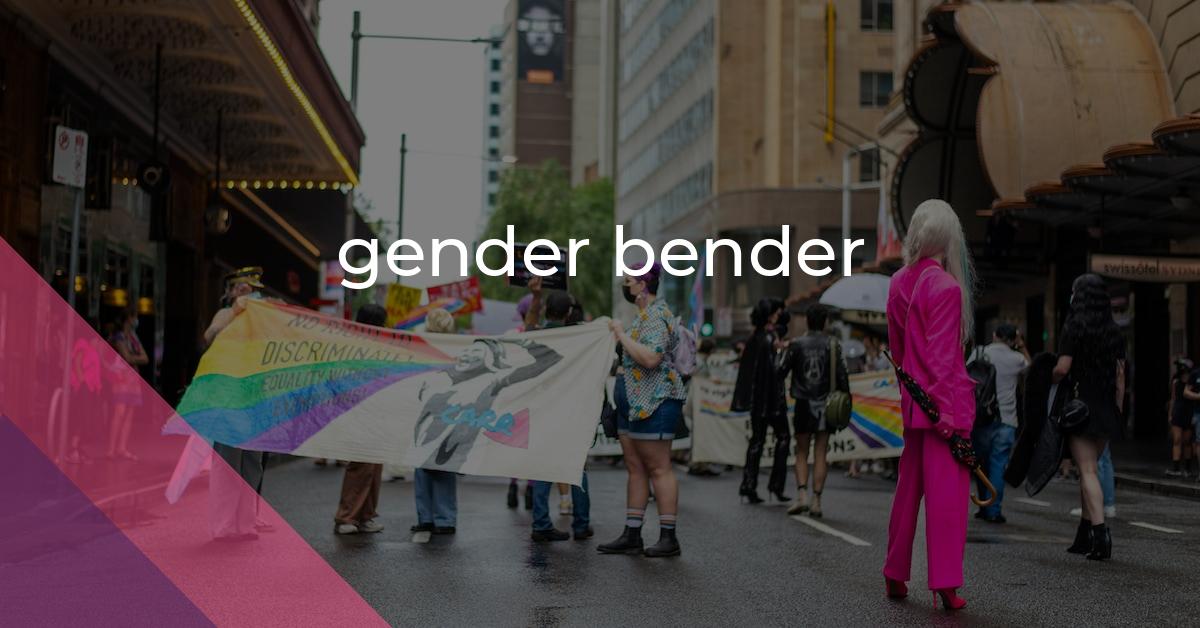gender bender: Idiom Meaning and Origin
What does ‘gender bender’ mean?
The idiom "gender bender" refers to a person, usually in the context of entertainment or fashion, who challenges or subverts traditional gender roles and expectations, often by adopting clothing, behavior, or appearance typically associated with the opposite gender.

Idiom Explorer
The idiom "in character" means acting or behaving in a way that is consistent with one's typical behavior or personality.
The idiom "go rogue" means to act in a rebellious and unpredictable manner, disregarding rules or expectations. It refers to someone who goes against the established norms or authority, often causing disruption or chaos.
The idiom "get changed" means to change one's clothes or appearance, typically in order to look more presentable or appropriate for a specific situation or event.
The idiom "get bent" is an offensive expression typically used to dismiss or belittle someone, urging them to go away or expressing frustration towards them. It is considered rude and impolite.
The idiom "genderfucker" is a term used to describe someone who intentionally challenges or subverts traditional gender norms, often through their appearance, behavior, or activism.
An idiom that means to go against or defy something, often in a defiant or bold manner.
The idiom "fish out of water" refers to a person who feels uncomfortable or out of place in a particular situation or environment.
A faux queen is someone who identifies as a woman and performs as a drag queen, despite being assigned female at birth. This term is often used within the LGBTQ+ community to describe a drag performer who is not biologically male.
Gender Identity Twist
The idiom "gender bender" is a phrase that has become popular in recent years, particularly in discussions surrounding gender identity and expression. While the origins of the phrase remain somewhat ambiguous, it is generally believed to have emerged in the late 20th century.
The term "gender bender" is often used to describe individuals who challenge traditional gender norms and expectations by expressing their gender identity in a way that may be considered unconventional or non-binary. It can also be associated with related idioms such as "genderfucker-idiom-meaning-and-origin/">genderfucker", "genderfuck", and "girly".
One possible source of the idiom can be traced back to the early days of the LGBTQ+ rights movement when drag performers and individuals who defied gender norms were referred to as "gender benders." These individuals were seen as breaking down the barriers between masculine and feminine identities and were celebrated for their ability to challenge societal expectations.
Over time, the term "gender bender" has evolved and is now used more broadly to encompass a wider range of gender nonconforming behaviors and identities. It has been linked to the concept of "genderfuck," which refers to intentionally confusing or blurring gender roles and expressions.
The idiom is also associated with the term "genderfucker," which describes a person who intentionally challenges and disrupts traditional gender norms and expectations. This term is often used to express a sense of defiance and rebellion against societal expectations and limitations.
Additionally, the term "girly" can be linked to the idiom "gender bender." This term is often used to describe individuals, regardless of their gender identity, who embody or embrace traditionally feminine characteristics or styles. It can be seen as a way of challenging and subverting societal expectations related to gender roles.
In addition to its association with LGBTQ+ culture, the phrase "gender bender" has gained popularity in the entertainment industry. It is often used to describe characters in films, television shows, or books who defy traditional gender roles or exhibit characteristics that challenge societal expectations.
These characters may engage in cross-dressing or have a gender identity that is intentionally ambiguous, leading to plot twists and explorations of gender dynamics. The use of the idiom in this context serves as a way of generating intrigue and capturing the audience's attention.
However, it is important to acknowledge that the term "gender bender" is not universally embraced. Critics argue that it perpetuates harmful stereotypes and reinforces the gender binary by suggesting that individuals can only exist within the confines of male or female.
Furthermore, some argue that the idiom overlooks the complexity of gender identity and may trivialize the experiences of transgender and non-binary individuals who face significant challenges in their everyday lives. These concerns highlight the importance of understanding and respecting the nuanced nature of gender identity.
Despite the controversy surrounding the phrase, "gender bender" has undeniably become a widely recognized idiom in modern society. It has gained traction both as a descriptor for individuals who challenge traditional gender norms and as a popular trope in various forms of media.
By incorporating related idioms like "genderfucker," "genderfuck," and "girly," the idiom "gender bender" highlights the fluidity and complexity of gender identity. It recognizes that individuals possess the agency to defy societal expectations and create their own unique expressions of gender.
The use of these idioms also reflects a growing awareness and acceptance of diverse gender identities and expressions. Society is becoming more open to different ways of understanding and experiencing gender, and the idiom "gender bender" is a reflection of this evolving mindset.
The idiom "gender bender" has emerged from LGBTQ+ culture and has expanded to encompass a broader range of gender nonconforming behaviors and identities. While it has gained popularity and recognition, it is not without its critics who argue that it oversimplifies the experiences of transgender and non-binary individuals.
Despite its limitations, the idiom reflects a changing societal understanding of gender and highlights the importance of recognizing and respecting diverse gender identities. It serves as a reminder that gender is not a fixed or binary concept, but rather a fluid and individual expression of self.
Example usage
1. The movie "Mulholland Drive" is a mind-bending gender bender, blurring the lines between male and female characters throughout the twist-filled plot.
2. With her unique fashion sense, she loves to experiment with different styles and often creates a gender bender look by mixing traditionally male and female clothing.
3. The play "Twelfth Night" by William Shakespeare is a classic example of a gender bender, as the main character Viola disguises herself as a man and causes romantic confusion among the other characters.
More "Gender" idioms



